Docs moved to new Domain
We have today moved the rsyslog official documentation to https://docs.rsyslog.com/doc instead of our long-standing location directly on www.rsyslog.com/doc. All existing links will be properly redirected. The goal is to keep the all-important doc set on its own resource, which helps with scaling and ensuring availability of the documentation.
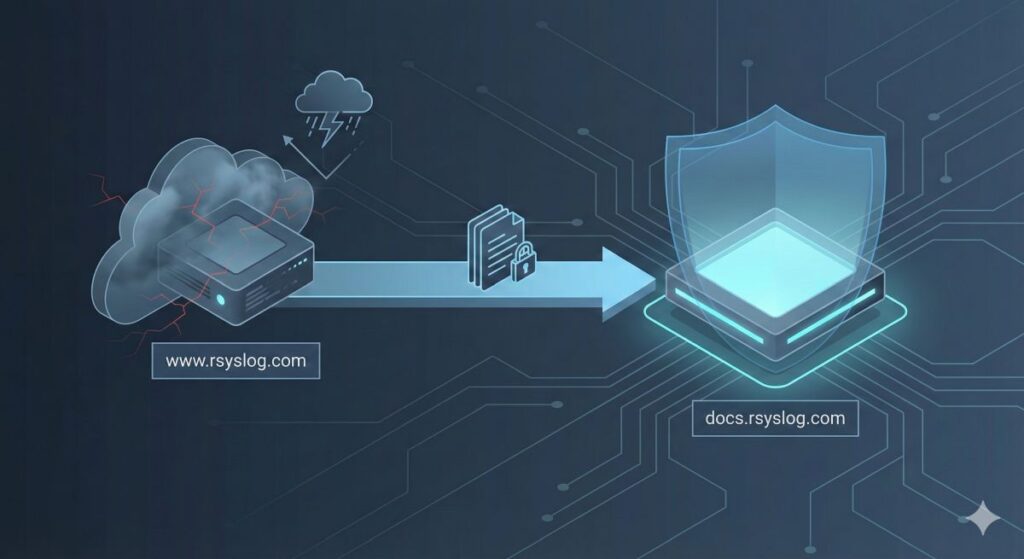
This move was considered for quite a while and has its pros and cons. The ultimate reason we are doing it, and doing it now is a cyberattack against rsyslog.com which began four days ago. While we mitigated it quickly, it led to unavailability of the doc for around one hour. That made us finally make the decision to move doc to a dedicated system, which we can make more robust than the full featured site with it’s dynamic content.
Continue reading “Docs moved to new Domain”rsyslog 8.2602.0: ROSI Collector, rate-limit policies, stronger TLS, and telemetry integration
We have released rsyslog 8.2602.0, the February 2026 scheduled-stable version. Scheduled-stable releases are bi-monthly snapshots of the daily-stable branch, providing predictable update points with the same functional content as daily-stable at the time of the snapshot.
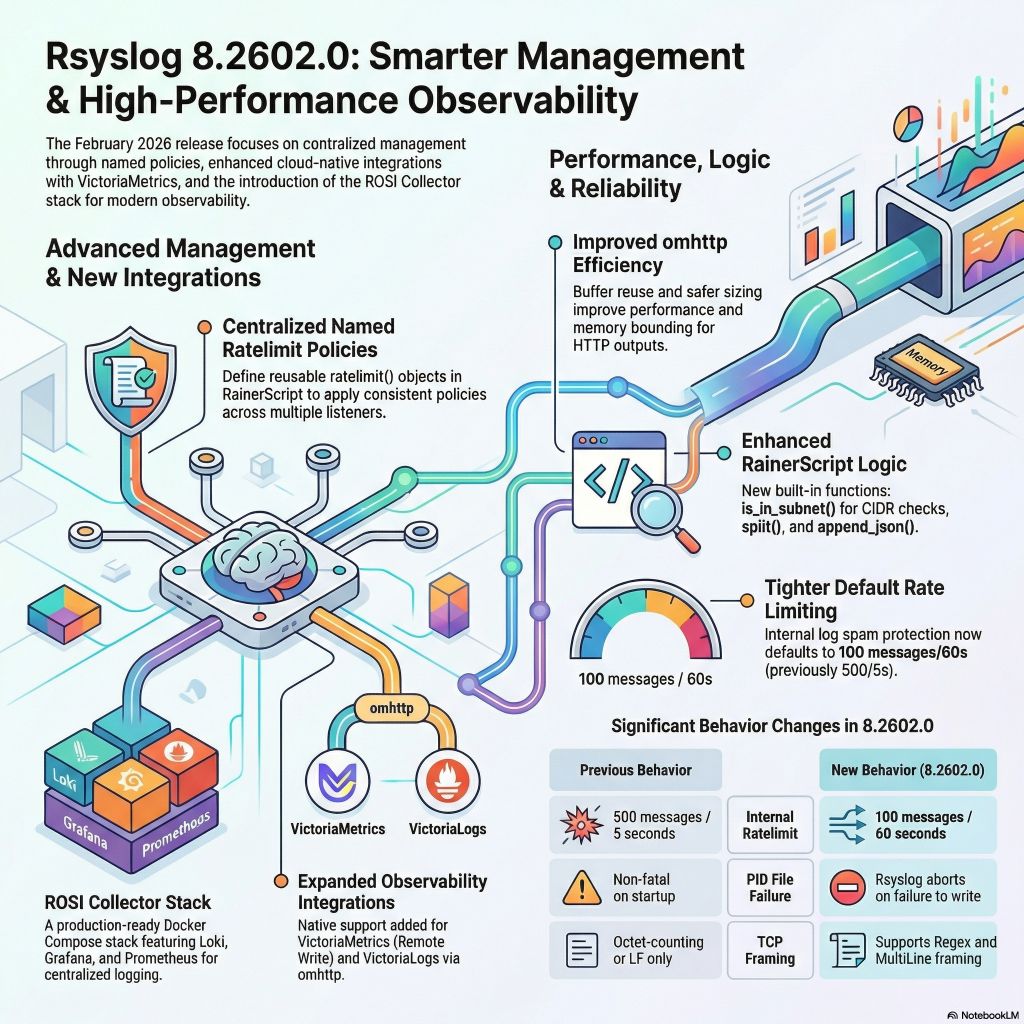
This release introduces a new production-ready deployment stack and continues significant runtime and security hardening.
Four major highlights:
- ROSI Collector: centralized log collection stack
- Named rate limit policies for imtcp and imptcp
- Security and TLS hardening
- Telemetry and ecosystem integration
The rsyslog 2025 Year in Review
Evolving Proven Infrastructure for a New Era
The year 2025 was a defining year for rsyslog. Not because of a single feature or release, but because several long-running threads finally converged: AI-assisted workflows, even fuller multi-core scalability, and native integration with modern observability stacks.
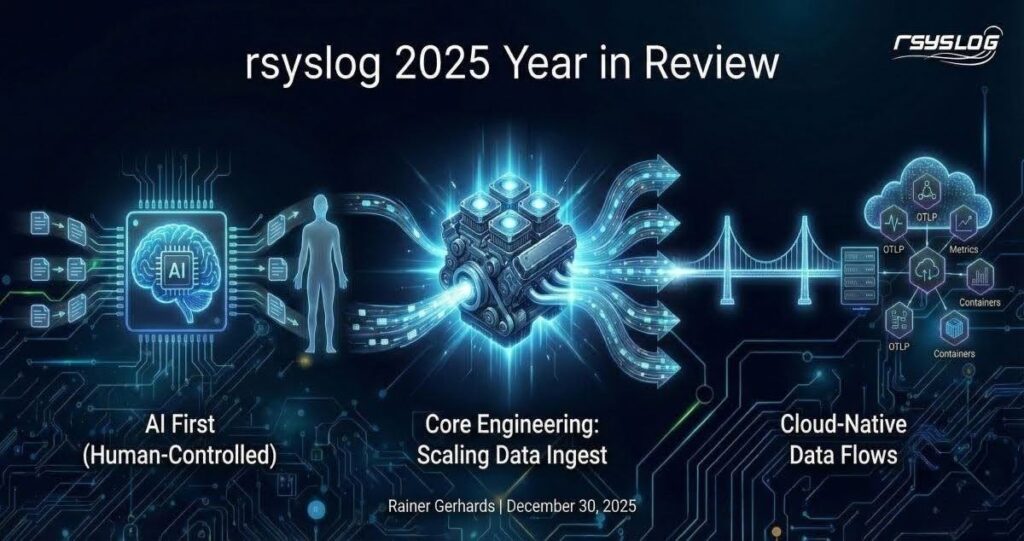
Rather than chasing trends, rsyslog focused on evolving what it already does best: reliable, high-performance log and data processing for real-world infrastructure.
At the same time, the project continued a shift that has been underway for years. For quite some time now, rsyslog has been more than a syslog daemon. It is increasingly used as a flexible, programmable data and information pipeline that happens to excel at logs.
Continue reading “The rsyslog 2025 Year in Review”Season’s Greetings from the rsyslog Project
As the year comes to a close, we would like to send our warm thanks to everyone who makes the rsyslog project what it is.

To our users, contributors, and community members around the world: thank you for your trust, feedback, bug reports, patches, documentation work, and thoughtful discussions throughout the year. Open source only works because of people who care, and rsyslog is no exception.
Continue reading “Season’s Greetings from the rsyslog Project”rsyslog 8.2512.0: network namespaces, omhttp enhancements and much more
We have released rsyslog 8.2512.0, the December scheduled-stable version. Scheduled-stable releases are bi-monthly snapshots of the daily-stable branch, providing predictable update points with the same functional content as daily-stable at the time of the snapshot.
This release contains three major highlights:
- Completion of the foundational Network Namespace implementation, developed by Billie Alsup.
- A major omhttp refactoring and feature upgrade, contributed by Adrien GANDARIAS, with substantial integration work on the PR.
- The newest contribution: significant mmsnareparse enhancements by André Lorbach (Adiscon), expanding and refining modern SNARE and Windows event parsing capabilities.
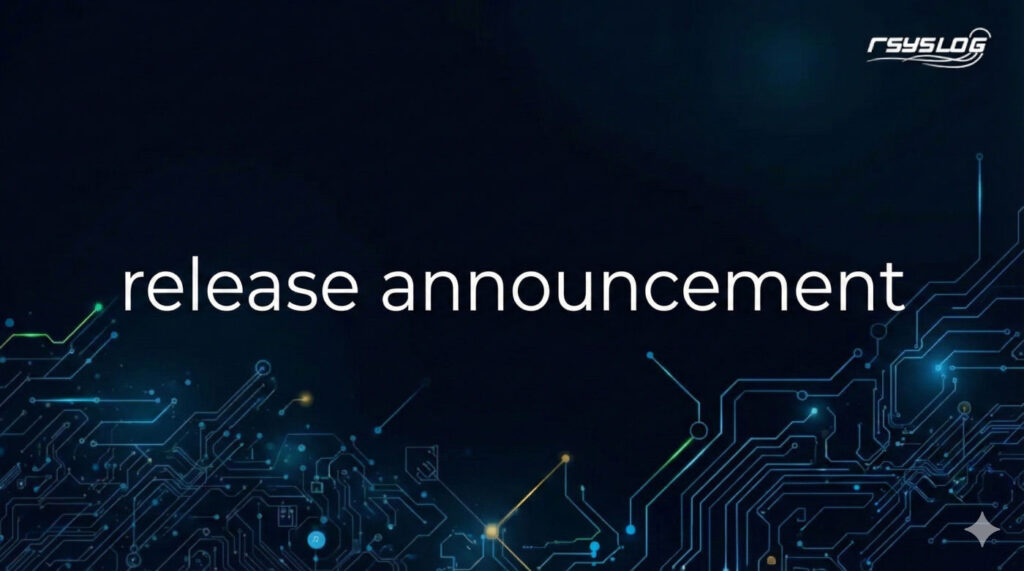
Documentation improvements continue across the tree. As always, rsyslog.com/doc documents the current codebase.
Continue reading “rsyslog 8.2512.0: network namespaces, omhttp enhancements and much more”rsyslog AI Assistant Update
We’ve applied a small knowledge base correction to the rsyslog AI Assistant (ChatGPT and DigitalOcean Gradient versions), both available at rsyslog.ai.
While minor, this update improves answer accuracy and consistency for configuration and troubleshooting topics.
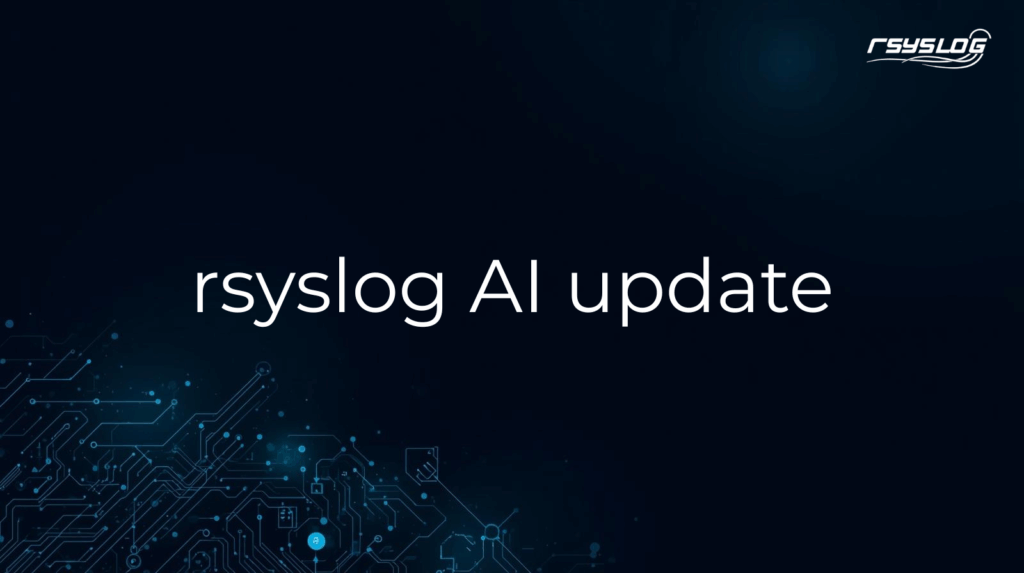
Keeping rsyslog Accessible Worldwide
The rsyslog project continues to evolve — not only in performance and functionality, but also in how it ensures reliable global access for developers and users. In a time of increasing network fragmentation, rsyslog’s infrastructure is designed to remain reachable, maintainable, and open, regardless of regional conditions.

A long tradition of openness
Since its early days on SourceForge and CVS, rsyslog has steadily adapted to modern platforms while avoiding vendor or platform lock-in. The project migrated from CVS to git, then from self-hosted systems to GitHub, and now extends its reach through a set of regional mirrors. Each transition has followed one guiding principle: technology should remain open and accessible to all.
The rsyslog team has consistently favored diversity in infrastructure — multiple CI systems, different hosting providers, and redundant build and test paths. Even though GitHub currently serves as the canonical repository, rsyslog’s CI ecosystem includes additional components such as Buildbot instances and Gitea-based mirrors, ensuring that no single platform is essential for the project’s operation.
Global mirrors for accessibility
To further strengthen accessibility, rsyslog now provides regional mirrors for easier source code access:
- GitHub (canonical): github.com/rsyslog/rsyslog
- European mirror (Germany, hosted on Digital Ocean):
github-mirror.rsyslog.com/rsyslog/rsyslog - Community mirror (China, maintained by Gitee):
gitee.com/mirrors_rsyslog
These mirrors are intended purely for accessibility and resilience. They are not regional forks — all contributions and CI processes remain integrated through GitHub, where automated testing and code review take place. For developers affected by access restrictions, the team offers to forward contributions manually, ensuring that valuable work is never lost due to technical or political boundaries.
Built for resilience
This step builds upon rsyslog’s long-standing philosophy of redundant and distributed operations. During the COVID-19 pandemic and the European energy crisis, rsyslog maintained hot-standby mirrors of critical infrastructure — including its websites and CI components — in multiple data centers across regions. At peak uncertainty, DNS round-robin configurations and database replication allowed instant failover between European and U.S. nodes.
DigitalOcean continues to power parts of this network as an open-source sponsor, alongside additional providers that ensure geographic and operational diversity. At one point, when energy availability in Germany became a concern, a key system was temporarily relocated to Norway — demonstrating the flexibility and readiness of rsyslog’s infrastructure. The result is a system designed to survive global disruptions while keeping the project available to everyone who depends on it.
Philosophy and next steps
The addition of regional mirrors is part of a broader commitment to openness, reliability, and technological neutrality. rsyslog remains apolitical but proactive in maintaining accessibility — even as the world becomes more fragmented. The guiding idea is simple and enduring:
Open source should have no borders.
(FR) Le code ouvert ne devrait pas avoir de frontières
(ZH) 开源应该没有边界
(JA) オープンソースに国境はない
(ES) El código abierto no debe tener fronteras
(HI) ओपन सोर्स की कोई सीमाएँ नहीं होनी चाहिए
(AR) المصدر المفتوح يجب ألا يكون له حدود
Future improvements may include additional mirrors or CI redundancy on alternative platforms. For now, users and contributors can find the latest information — including all mirror links — in the main repository README.
Myth-Buster: rsyslog is not “just a legacy syslogd”
The myth is persistent — partly because of the name. Yes, rsyslog started life as an enhanced syslog daemon for Linux. But over two decades, it has evolved into a high-performance ETL engine that powers data pipelines in thousands of production environments.
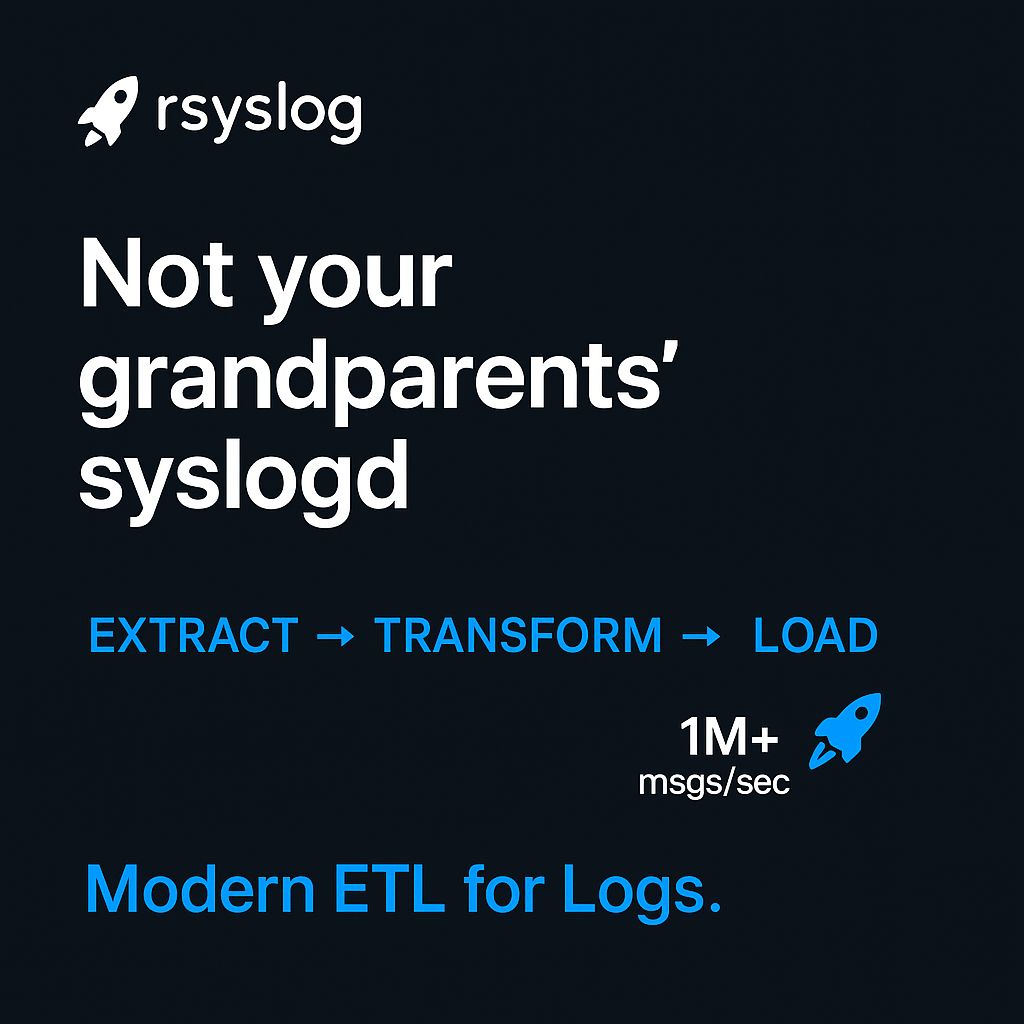
Adiscon joins connect.IT Heilbronn-Franken — why this matters to rsyslog
Adiscon, the main sponsor of rsyslog, has joined connect.IT Heilbronn-Franken, a regional non-profit network linking companies, startups, universities, and public institutions across AI, data, cloud, and cybersecurity. We highlight connect.IT because it is a strong regional hub, and we are here to learn.

rsyslog 8.2510.0 (2025.10) released
We have today released the 8.25100 rsyslog scheduled stable release. This release delivers three main themes: better Windows Security event ingestion, more flexible JSON handling end to end, and pragmatic compatibility fixes across popular outputs and platforms. It also includes steady documentation improvements and CI hardening.
Continue reading “rsyslog 8.2510.0 (2025.10) released”